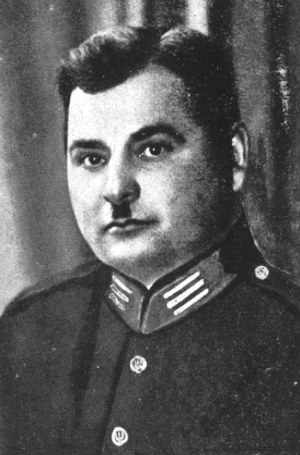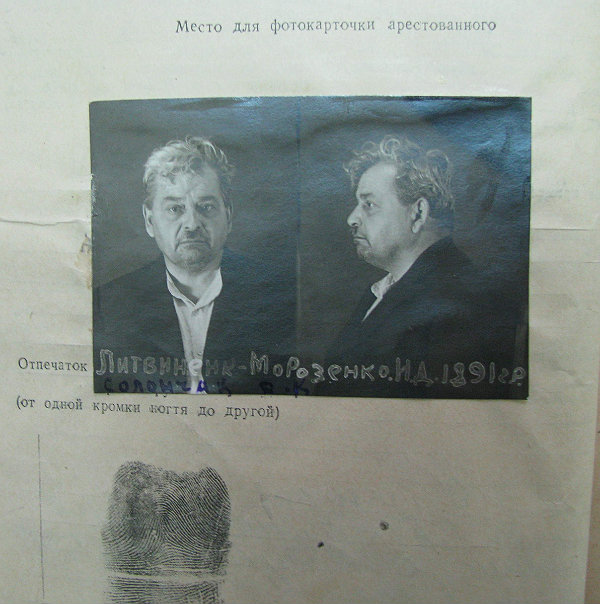Gallery of Нeroes
Intelligence Officer of the Ukrainian People’s Republic
Ivan Lytvynenko
In conditions of absence of statehood, when all military-political machine of aggressor countries worked for the intelligence services of the enemy of Ukraine, the work of the Ukrainian intelligence could be conducted thank to the efforts of exceptionally devoted and deep-cover people. One of such people is Ivan Lytvynenko – a man who passed through the whirl of two stages of the Ukrainian liberation movements.

In the register book of St. Catherine’s Church in Khoruzhivka village, there is a record of 1891 saying that January 4 (by new style January 17) a boy Ivan was born. About the parents it reads as follows: “the farmer – owner from the village of Khoruzhivka Danylo Lytvynenko and his legal wife Anastasiia, both belong to orthodox religion…”.
During the First World War, Lytvynenko was an officer of the Tsar’s Army.
Since 1917, he had been in the Army of the Ukrainian People’s Republic (UPR), where he was promoted to rank of Colonel.
He started his military service in the Ukrainian Army as a part of 147th Voronezh infantry druzhyna (brigade). He was transferred to 1st Ukrainian Guard regiment. He became the commander of sotnia (company), and later the commander of 3rd kurin (battalion) of 1st Kyiv Guard regiment.
Further, he is known as the assistant commander, then the commander of 1st Zaporizhzhia infantry regiment named after Hetman P. Doroshenko and the commander of 1st Zaporizhzhia division.
The next page of war for statehood, in which Ivan Lytvynenko actively participated, was the First Winter Campaign of the UPR’s Army into the rear of Bilshovyks and Denikins, which was unprecedented in the history of warfare by its character and heroism. He was the commander of Zaporizhzhia Joint cavalry regiment named after Bohdan Khmelnytskyi of Zaporizhzhia Corps of the UPR’s Army.
One of the glorious pages of the Winter Campaign became the events of April 16, 1920 in Voznesensk (now Mykolaiv region), where having defeated the units of 14th Red Army, the troops of the UPR’s Acting Army captured 28 guns, 32 thousand cannon rounds. There were also captured 48 machine guns and 5 thousand rifles and 2 million rounds of ammunition for them, 4 thousand horse carts with clothes, footwear and other property, and even 10 million rubles. The hero of the battle for Voznesensk was the commander of Zaporizhzhia Joint Cavalry regiment named after Bohdan Khmelnytskyi Ivan Lytvynenko.
Later, Colonel Lytvynenko commanded 2nd brigade of 1st Zaporizhzhia rifle division of the UPR’s Army, then – the head of the military delegation to the General P. Vranhel’s Volunteer Army; he visited Poland and Romania. It was he who in late summer of 1920 was authorized by Main Otaman Symon Petliura to negotiate with baron Vrangel.
The history does not mention where and under what circumstances Ivan Lytvynenko became a professional military intelligence officer.
I. Lytvynenko – “Morozenko” was involved in the secret service of the UPR by the leader of the UPR’s Special Services Mykola Chebotarev in 1924, later he worked in the Counterintelligence State Center of the UPR in exile.
In June 1927, Lytvynenko, sent by Chebotarev, who at that time was the Head of the Second Section of the Military Ministry, primarily became the Head of Intelligence Point in Mohyliany (near Ostroh), and from autumn of 1928 – in Rivne, where he finished his intelligence activities in 1935.
Then Lytvynenko moved to Warsaw and till January 1936 was working with another renowned counterintelligence officer General Vsevolod Zmiienko.

Pursuing intelligence activities, I. Lytvynenko was a constant subject to attention of Soviet special services. In the document, made on the basis of the information, supplied by agents, and investigative materials in 1939, in the chapter “Ukrainian Terrorist Organizations in Poland”, he is mentioned among the ten most influential and active members of the UPR’s government in exile.
His characteristic is quite telling: “… a former Colonel of Petliura’s Army. In emigration – the leader of the UPR’s intelligence service in Northern Volyn. Lived permanently in Rivne. Managed the intelligence service in Rivne, Ostroh, Zdolbuniv, Rokytne… An active and experienced intelligence officer sent dozens of agents into the Soviet side”.
In the intelligence activity of the State Center of the UPR in exile was involved a Ukrainian military and political leader Taras Bulba-Borovets, who wrote about this as follows: “Colonel Ivan Lytvynenko lived then in Rivne. According to the order of the UPR’s government, he was leading the Ukrainian Intelligence Service on Soviet-Polish border. On Colonel Lytvynenko’s order, our young people were passing over to the other side the directives of the UPR’s government and literature, and from there they were receiving a variety of materials, Soviet newspapers and books. We got involved in the anti-Bolshevik campaign with all our soul and were struggling by all possible means…”.
From Borovets we get perhaps the only brief characteristics of Lytvynenko: “Colonel Lytvynenko was one of the most active members of our organization among the older generation. He was an ardent patriot of the labor Ukraine, a brave warrior, a wise politician, most honest friend and the father of a warrior”.
Organizing the “Polissia Sich” on Volyn and Polissia at the beginning of the Second World War, (from which the UPA originates) Otaman Bulba-Borovets used, first of all, Colonel Lytvynenko’s military and intelligence experience.
In September 1943, Lytvynenko with two other former Colonels of the UPR’s Army joined the Ukrainian Insurgent Army (UPA). His organizational ability and combat experience were very useful in the Army, which began fighting against Hitlerite Germany and Stalin’s Soviet Union.
He was almost at the origins of the Intelligence Service of the UPA as the Head of the Intelligence Service of the Regional Military Staff of the UPA – North.
Later, he became an instructor of the “Druzhynnyky” Starshyna (Officer) School of the UPA, where on the UPA – North Commander Dmytro Kliachkivskyi – “Klym Savur”’s proposal, Colonel Lytvynenko taught course “Combat Intelligence” and controlled the graduation of starshynas (officers).

Because of the progressing disease after a personal meeting with a member of the Central Provid (Leadership) of the OUN Vasyl Kuk – “Lemish” and receiving tasks, Colonel Lytvynenko retired from military service and went underground.
For some time, Lytvynenko had been living illegally in Lviv, completing various assignments of the OUN underground. He was later found and arrested by the Soviet prosecution authorities. Colonel was shot to death in Lukianivka prison on February 17, 1947.
Only on August 24, 2007, the memorial plaque in his honour was unveiled in Khoruzhivka. When the hero’s great grand-children stood next to it – the present were impressed by the likeness – “breed” was seen through centuries…